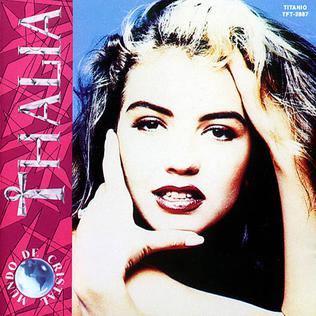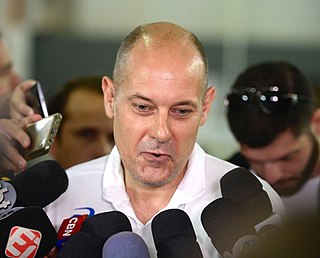
Hans-Joachim Koellreutter was a Brazilian composer, teacher and musicologist.

Mexican recording artist Luis Miguel has released 21 studio albums, 30 compilation albums, three extended plays (EP) two live albums, two soundtrack albums and five box set. Luis Miguel has sold over 60 million records, making him one of the best-selling Latin music artists of all time. Luis Miguel is also the artist with the second-most number ones on the Billboard Top Latin Albums chart with nine albums. At the age of 11, he released his debut studio album, Un Sol (1982), which was certified platinum and gold in Mexico. The artist would release four more studio albums under the record label EMI: Directo al Corazón (1982), Decídete (1983), También es Rock (1984), and Palabra de Honor (1984). A Portuguese-language version of Decídete and Palabra de Honor were released in Brazil as Decide Amor and Meu Sonho Perdido, respectively. Luis Miguel made his acting debut in the film as the lead role on Ya nunca más (1984) and recorded its soundtrack. In 1985, he participated in the Sanremo Music Festival 1985 with the song "Noi ragazzi di oggi"; it placed second in the Big Artist category and was later included on the Italian-language edition of Palabra de Honor. In the same year, Luis Miguel recorded the soundtrack for the film Fiebre de Amor, which he co-starred with fellow Mexican singer Lucero.

"Que Me Quedes Tú" is a song by Colombian singer Shakira from her fifth studio album Laundry Service (2001). It was written by Shakira and composed by her and longtime friend Luis Fernando Ochoa. The song was released as the fifth single from Laundry Service and the lead single from her first Spanish greatest hits album Grandes Éxitos (2002) on 11 November 2002 by Epic Records.

Mundo de Cristal is the second studio album by Mexican singer Thalía, released in Mexico on 26 September 1991, by Fonovisa Records. It was Thalía's second and last album to be produced by Alfredo Díaz Ordaz, who was her boyfriend at that time and died of hepatitis in 1993. Mundo de Cristal was certified 2× Gold in Mexico for shipments of 200,000 units. The most successful singles from the album were "Sudor", "En La Intimidad" and "Fuego Cruzado". To celebrate Thalía's 25th anniversary as a solo artist, this album is available in the digital platforms iTunes and Spotify since December 2014.

"A Puro Dolor" is a song recorded by Puerto Rican band Son by Four. It was written by Omar Alfanno and released as the first single of the second studio album of the band in 1999. Two versions of the track were produced by Oscar Llord for the album; one as a salsa and the other as a ballad. The ballad version was arranged by Alejandro Jaén.

America Tour 1996 was a concert tour performed by Luis Miguel during the last part of 1996 to promote his last album Nada Es Igual. It only lasted for one month and it only took place at some places in South America, like Buenos Aires, Argentina in the River Plate Stadium, Santiago de Chile, Uruguay, Peru, Paraguay, Ecuador and Brazil.

"Regresa a mí" is a song by Thalía, from her album Arrasando. It is her biggest hit to date in European countries like Czech Republic, Slovakia and Poland. As a result of its success, Arrasando was certified platinum in the Czech Republic the song reached number three.

"Lo Haré Por Ti" is a song recorded by Mexican singer Paulina Rubio for her fifth studio album Paulina (2000). Written by Estefano and produced by Chris Rodriguez, the bolero-influenced pop-rock song was then released as the lead single from Paulina on January 11, 2000, through Universal Music Latin, Polydor Records and Muxxic Recods. The song was considered Rubio's "comeback" single after the dissolution of her contract with EMI Music in the late 1990s. Lyrically, the song is about a woman who is willing to do anything for the man she loves, with refers to the tangos of the French Argentine artist Carlos Gardel.

Morten Soubak is a Danish handball coach for Primeiro de Agosto and the Angola women's national team. He coached the Brazilian national team between 2009 and 2016 and lead them to a historic title at the 2013 World Women's Handball Championship.

Handebol Clube Taubaté is a handball club from Taubaté, Brazil. Currently, they compete in the Brazilian National League and it is the current vice champion.

Esporte Clube Pinheiros, abbreviated as E.C. Pinheiros, is a handball club from São Paulo, Brazil. Currently, they compete in the Brazilian National League and it is the current champion.
The South and Central Men's Club Handball Championship, organized by the South and Central America Handball Confederation, is the official competition for men's handball clubs of South and Central America qualifying the champion of the competition to the IHF Super Globe. The competition was established in 2019 but its 2020 edition was cancelled due to the COVID-19 pandemic.
Twindemic is a term used during the COVID-19 pandemic, referring to the possibility of a severe flu season happening alongside an increase in cases of COVID-19 during the fall and winter of 2020 and 2021. A consequence of a twindemic may be a mixture of two different infections in the same person at the same time. The term twindemic is a portmanteau of "twin" and "pandemic".
This article shows the rosters of all participating teams at the women's handball tournament at the 2020 Summer Olympics in Tokyo.
Marcos Roberto Dias Cardoso, also known as Marcos Roberto was a singer and Brazilian composer, successful since the 1960s and in the 1980s with the song A Última Carta, which was in first place on the charts for months and sold more than 2 million records.
Peter de Been is an Australian martial artist who helped pioneer the art of Brazilian Jiu-jitsu in Australia.

"Bachata Rosa" is a song by Dominican Republic singer-songwriter Juan Luis Guerra released in 1991 and served as the lead seventh and final from his fifth studio album Bachata Rosa (1990). Along with Estrellitas y Duendes and Como Abeja Al Panal, is one of Guerra's first international hits and helped to contributed to the bachata sophistication and have recognition in Latin America and Europe. The track was a commercial success, toping the airplay charts in Mexico and was the fourth single of the album to peak insade of the top 10 at the US Hot Latin Tracks.

The assassination attempt on Prudente de Morais took place on 5 November 1897, when then president of Brazil Prudente de Morais appeared at the War Arsenal to welcome the victorious military forces returning from the War of Canudos, in Bahia. During the ceremony, in the early afternoon, Morais was approached by an armed young man from the 10th Infantry Battalion, Marcelino Bispo de Melo, who pointed a gun in Morais' direction. The gun, however, did not fire. There was time for marshal Carlos Machado de Bittencourt, the Minister of War, and colonel Luiz Mendes de Moraes, chief of the president's security, to intervene in defense of the president. At this point, the attacker, who was also wielding a knife, wounded the colonel and stabbed marshal Bittencourt several times, who ended up dying from his wounds.

Roy del espacio is a 1983 Mexican animated science fiction film produced and directed by Hector López Carmona, Rafael Ángel Gil and Ulises Pérez Aguirre. Produced from 1979 to 1982, it is one of the first feature-length Mexican animated films ever made. Its plot follows the titular Roy, who, along with Dr. Faz and psychologist Elena, travels to a distant planet and faces an evil emperor who wants to conquer the Earth. Roy del espacio premiered on 3 March 1983, playing in several theatres in Mexico.













